In 2013 we started what seems to have become an end of the year tradition: Interesting Reading Areas. What would be the Interesting Books for the next year?
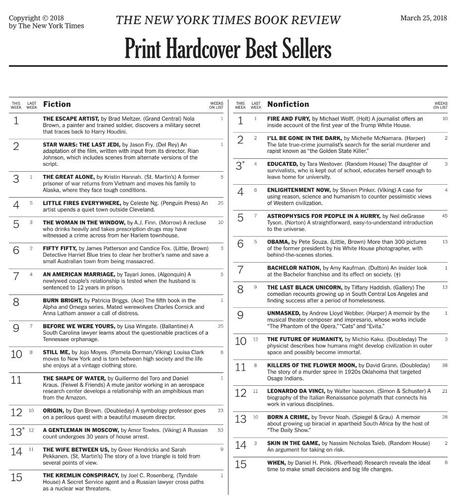
Most end-of-the-year lists of books consist of books that have already been read by others and many of the lists of the main street media consist of the same books. Often the lists consist of the books that have topped the sales lists during the year. The underlying message could be interpreted as “if you haven’t read these books, you are a cultural bar-bar, does not belong to the well-informed elite and not able to go along in conversations”. Anyhow, this is passive, following the main stream opinions as dictated by the main-stream-media. We propose a more active atitude by suggesting to look for books that fits your interests, instead of the other way around.
Our list of Interesting Reading Areas 2020 – our list of books we would like to read next year – is centered around the theme of Origin; the point or place where something begins, arises, or is derived.
How the Earth Shaped Human History by Lewis Dartnell
Origins by Lewis Dartnell stands comparison with Yuval Noah Harari’s Sapiens. ‘A sweeping, brilliant overview of the history not only of our species but of the world’ Peter Frankopan, author of The Silk Roads When we talk about human history, we focus on great leaders, mass migration and decisive wars. But how has the Earth itself determined our destiny? How has our planet made us? As a species we are shaped by our environment. Geological forces drove our evolution in East Africa; mountainous terrain led to the development of democracy in Greece; and today voting behavior in the United States follows the bed of an ancient sea.
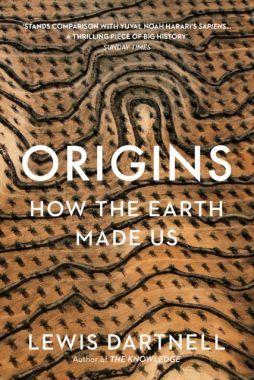
The human story is the story of these forces, from plate tectonics and climate change, to atmospheric circulation and ocean currents. How are the Himalayas linked to the orbit of the Earth, and to the formation of the British Isles? By taking us billions of years into our planet’s past, Professor Lewis Dartnell tells us the ultimate origin story. When we reach the point where history becomes science we see a vast web of connections that underwrites our modern world and helps us face the challenges of the future. From the cultivation of the first crops to the founding of modern states, Origins reveals the Earth’s awesome impact on the shape of human civilizations.
Biomimicry with Theo & Tuva: Nature spotting inspires wild ideas

Join Theo and Tuva on their nature walks and be inspired by their observations using a biomimicry lens of the natural world. Imaginative play is important for creativity, and a walk in nature could inspire so many ideas. Check out how fantastic the fox’s nose is, how dragonflies can stand still in the air, how the otter keeps warm, and how bats send out signals to form a mental map of their surroundings. Use the observations as inspiration for new ideas.
Written by our own co-author of this blog Åsa Jomård (Author), Cecilia Larsson (Illustrator) and Ann-Margrethe Iseklint (Photographer).
Underland by Robert Macfarlane
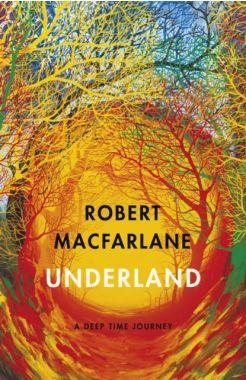
In Underland, Robert Macfarlane takes us on a journey into the worlds beneath our feet. From the ice-blue depths of Greenland’s glaciers, to the underground networks by which trees communicate, from Bronze Age burial chambers to the rock art of remote Arctic sea-caves, this is a deep-time voyage into the planet’s past and future. Global in its geography, gripping in its voice and haunting in its implications, Underland is a work of huge range and power, and a remarkable new chapter in Macfarlane’s long-term exploration of landscape and the human heart.
Infinite Baseball: Notes from a Philosopher at the Ballpark by Alva Noë
Baseball is a strange sport: it consists of long periods in which little seems to be happening, punctuated by high energy outbursts of rapid fire activity. Because of this, despite ever greater profits, Major League Baseball is bent on finding ways to shorten games, and to tailor baseball to today’s shorter attention spans. But for the true fan, baseball is always compelling to watch and intellectually fascinating. It’s superficially slow pace is an opportunity to participate in the distinctive thinking practice that defines the game. If baseball is boring, it’s boring the way philosophy is boring: not because there isn’t a lot going on, but because the challenge baseball poses is making sense of it all.
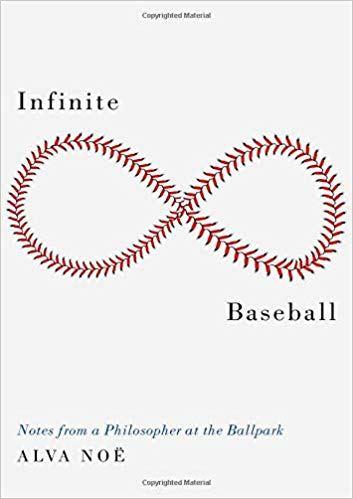
In this deeply entertaining book, philosopher and baseball fan Alva Noë explores the many unexpected ways in which baseball is truly a philosophical kind of game. For example, he ponders how observers of baseball are less interested in what happens, than in who is responsible for what happens; every action receives praise or blame. To put it another way, in baseball as in the law we decide what happened based on who is responsible for what happened. Noe also explains the curious activity of keeping score: a score card is not merely a record of the game, like a video recording; it is an account of the game. Baseball requires that true fans try to tell the story of the game, in real time, as it unfolds, and thus actively participate in its creation.
Some argue that baseball is fundamentally a game about numbers. Noe’s wide ranging, thoughtful observations show that, to the contrary, baseball is not only a window on language, culture, and the nature of human action, but is intertwined with deep and fundamental human truths. The book ranges from the nature of umpiring and the role of instant replay, to the nature of the strike zone, from the rampant use of surgery to controversy surrounding performance enhancing drugs. Throughout, Noe’s observations are surprising and provocative.
Loserthink: How Untrained Brains Are Ruining America
From Scott Adams, the creator of Dilbert and author of Win Bigly, a guide to spotting and avoiding loserthink: sneaky mental habits trapping victims in their own bubbles of reality.
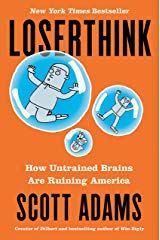
If you want a great book which will make you think, and maybe believe that our problems are solvable, this is the book for you. It contains chapters asThinking like a psychologist, an artist, an historian, an engineer, a leader, an scientist, an entrepreneur, an economist. How to break out of your mental prison.
Super Thinking: The Big Book of Mental Models
The world’s greatest problem-solvers, forecasters, and decision-makers all rely on a set of frameworks and shortcuts that help them cut through complexity and separate good ideas from bad ones. They’re called mental models, and you can find them in dense textbooks on psychology, physics, economics, and more.
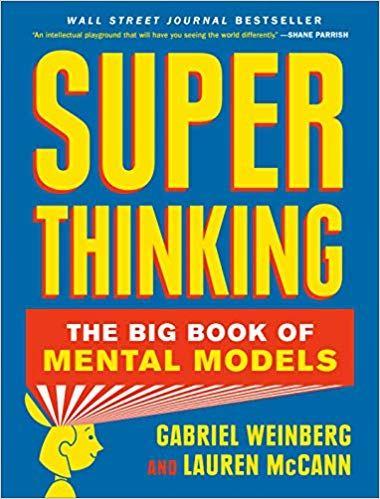
A review by Ksenia G. Might be the most important book in your life. I learned some new important concepts from it, but if this book had been available earlier it could have saved me a lot of time. Sure, reading a whole book on one topic could give you more insights and examples to better grasp the concept but at the end of the day you can’t retain all nuances in your head and are left with the most important idea from the book. This is what “Super Thinking” is all about – it gives you an array of useful ideas with vivid examples so you could understand every concept without you reading an elaborate 300 pages explanation on every single concept.
Going Dark: The Secret Social Lives of Extremists by Julia Ebner
By day, Julia Ebner works at a counter-extremism think tank, monitoring radical groups from the outside, but two years ago, she began to feel that she was only seeing half the picture. She needed to get inside the groups to truly understand them. So she decided to go undercover in her spare hours – late nights, holidays, weekends – adopting five different identities, and joining a dozen extremist groups from across the ideological spectrum.
Her journey would take her from a Generation Identity global strategy meeting in a pub in Mayfair, to a Neo-Nazi Music Festival on the border of Germany and Poland. She would get relationship advice from ‘Trad Wives’ and Jihadi Brides and hacking lessons from ISIS. She was in the channels when the alt-right began planning the lethal Charlottesville rally, and spent time in the networks that would radicalise the Christchurch terrorist.

In Going Dark, Ebner takes the reader on a deeply compulsive, terrifying, illuminating journey into the darkest recesses of extremist thinking, exposing how closely we are surrounded by their fanatical ideology every day, the changing nature and practice of these groups, and what is being done to counter them.
